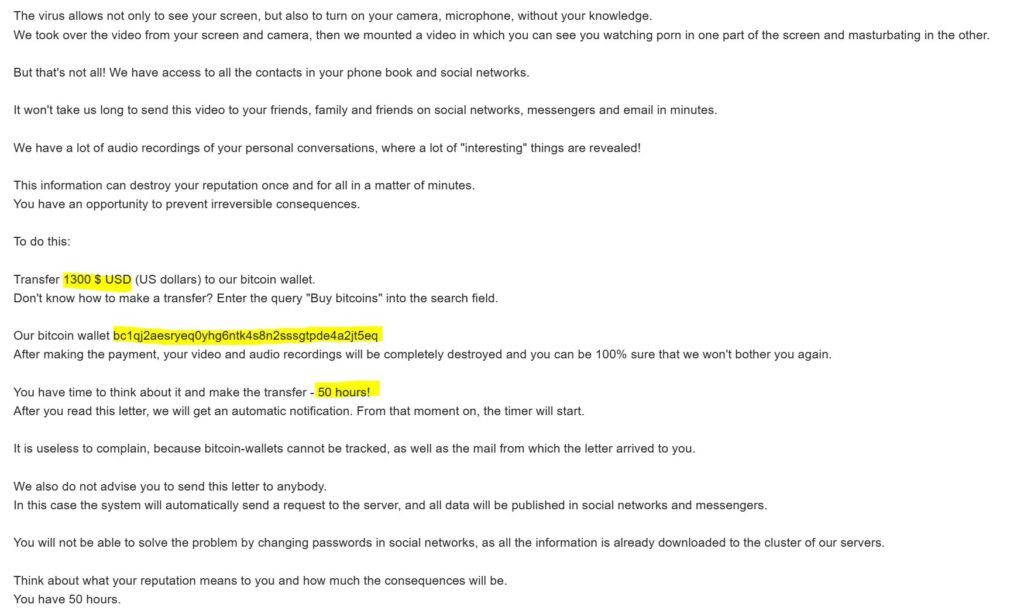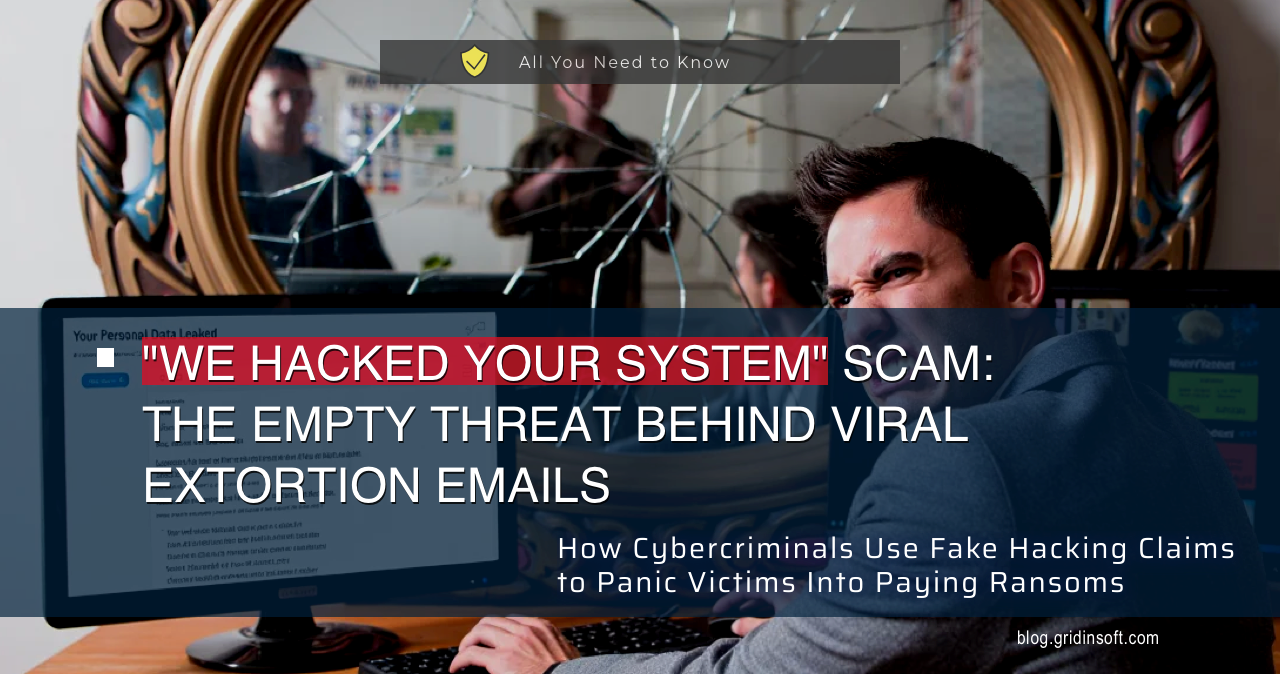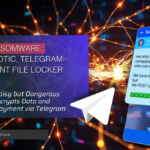The “We Hacked Your System” sextortion scam is making the rounds again. Like its close cousin, the Professional Hacker email scam, it claims someone has recorded you in compromising situations and demands payment. It’s basically the digital version of a schoolyard bully saying “Give me your lunch money or I’ll tell everyone your embarrassing secret” – except the secret doesn’t even exist.
What This Scam Claims
These emails usually begin dramatically: “Consider this message as your last warning. We hacked your system!” From there, the scammer spins a tale about how they’ve gained complete access to your device through a trojan virus, supposedly contracted when you visited an adult website.
The scammer then makes the bombshell claim – they’ve created a split-screen video showing you watching adult content on one side and your reaction via your webcam on the other. All your contacts, they threaten, are just a click away from receiving this fictional compilation unless you pay a ransom (typically around $1300 in Bitcoin).
The Fear-Inducing Subject Lines
These scams often arrive with alarming subject lines designed to make you open the email immediately. Common variations include:
- “Your System Was Breached By Remote Desktop Protocol”
- “Operating System Fell To My Hacking Expertise”
- “Time Is Slipping Away From Your Grasp”
- “I’ve Got Access To Your Smartphone”
Notice the urgent, threatening language. That’s your first clue something fishy is going on.
The Technical Bluff
Where the “Professional Hacker” scam talks about driver-level malware with signature updates, the “We Hacked Your System” variant claims to have a “Trojan virus that gives full access” and allows them to “not only see your screen but turn on your camera and microphone without your knowledge.”
Real malware certainly exists, but it doesn’t come with a ransom note announcing its presence. That would defeat the purpose – like a spy wearing a shirt that says “I’M A SPY” in big letters.
The Threat and Countdown
The email typically gives you about 50 hours (just over 2 days) to pay the ransom, usually around $1300 in Bitcoin. The artificial time pressure is designed to make you panic and pay without thinking clearly.
They also warn that if you share the email with anyone, they’ll immediately release the “compromising video.” This isolation tactic is meant to prevent you from getting a second opinion that might expose the scam.
The Bitcoin Wallet Telltale Sign
Just like in other sextortion scams, these emails include a Bitcoin wallet address for payment. If you see wallet addresses like these in threatening emails, they’re confirmed scams:
- bc1qj2aesryeq0yhg6ntk4s8n2sssgtpde4a2jt5eq
- bc1qzxzazuz7twfx4e0mzfg97606d5dytksue9j3ag
- 1N6TYc2FFJmjMDPnAKQgjRh65ou58EfQNM
- 12nEVuGNtRFMVjeVmLtD4nt2sHX68S47yH
Remember, cryptocurrency transactions are practically irreversible. Once you send money to these addresses, you can’t get it back.
Example of the “We Hacked Your System” Scam

Is This Scam Real?
Not even remotely. Like other sextortion scams, “We Hacked Your System” emails are sent in mass campaigns to thousands of recipients, hoping that a few scared individuals will pay up. The scammers have not:
- Infected your device with any trojan
- Recorded your webcam
- Created a split-screen video
- Stolen your contacts
- Accessed your social media
Real hackers who manage to compromise your system want to stay hidden as long as possible to steal valuable data. They don’t announce their presence with threatening emails – that would be counterproductive to their actual goals.
Why These Scams Keep Working
The psychology behind these scams is surprisingly effective. They exploit three powerful emotional triggers:
Fear of Exposure
By claiming to have recorded you in private moments, scammers tap into one of our deepest fears – having our private behaviors exposed publicly. The mere possibility creates instant anxiety, even if you know logically that the claim is false.
Shame as Leverage
The specific mention of adult websites is deliberate. By suggesting you were watching adult content, scammers are betting that embarrassment will cloud your judgment. This shame factor makes victims less likely to discuss the email with others who might help them realize it’s a scam.
Artificial Urgency
The 50-hour countdown is designed to force hasty decisions. When people feel rushed, they’re more likely to act on emotion rather than logic. This artificial deadline prevents victims from taking time to research whether the threat is legitimate.
What To Do If You Receive This Email
If this email lands in your inbox, here’s what you should (and shouldn’t) do:
- Don’t panic. These are mass-sent template emails with no actual evidence behind their claims.
- Don’t pay anything. Sending money only confirms you’re willing to pay, which may lead to more demands.
- Don’t reply to the email. This only confirms your address is active.
- Mark it as spam and delete it.
- Report the Bitcoin address to the FBI’s Internet Crime Complaint Center if you want to help authorities track these scammers.
For extra peace of mind, you can run a scan with GridinSoft Anti-Malware to confirm your system is clean. Unlike the mythical “undetectable” malware claimed in these emails, real malware can be detected and removed with proper security tools.
Protecting Yourself From Real Threats
While the “We Hacked Your System” email is fake, there are genuine cybersecurity risks out there. Here’s how to stay protected:
- Keep your operating system and software updated
- Use strong, unique passwords for all important accounts
- Enable two-factor authentication whenever possible
- Be careful about clicking links or opening attachments in emails
- Consider covering your webcam when not in use (a simple piece of tape works)
- Run regular security scans with reliable antivirus software
These sensible precautions will protect you from actual threats, not imaginary ones from “professional hackers” who seem more interested in writing scary emails than actual hacking.
Remember, if you receive one of these emails, the best response is a good laugh before hitting delete. The only thing these scammers have successfully hacked is the art of writing scary-sounding nonsense.





